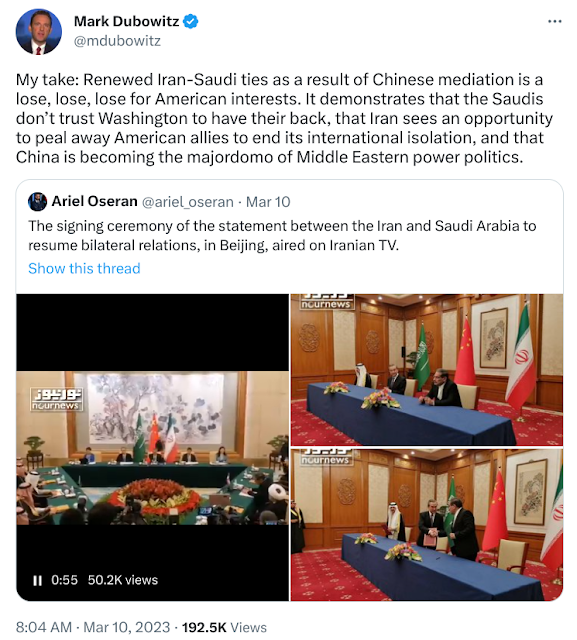By Daled Amos
On Friday, we learned that thanks to China, two enemies, Iran and Saudi Arabia, have decided to bury the hatchet -- and not in each other. Aside from reopening their embassies in each other's countries, Iran will be taking a step towards releasing the isolation that surrounds it, while Saudi Arabia will no longer be victimized by Houthi attacks.
At least, those are the hypothetical benefits, if this new agreement holds.
Meanwhile, there are all kinds of opinions about the agreement and what it means for the parties involved, for the region in general and for the US.
Naturally, there are those that see this development as an unmitigated disaster:
On the other hand, according to Hussein Ibish, Senior Resident Scholar at the Arab Gulf States Institute in Washington, this is just Saudi Arabia pursuing different options, so this agreement does not rule out the possibility of the Saudis pursuing normalization with Israel somewhere down the line. This is a thought that Jonathan Schanzer of the Foundation for Defense of Democracies agrees with. He sees this as a play by Saudi Arabia to pressure the US to provide the security guarantees it is looking for.
And just where does this leave Israel?
According to Daniel Shapiro, former US ambassador to Israel, this deal should not make Israel panic. He writes that the UAE, Israel's major partner in the Abraham Accords, does not see itself as a partner in a military coalition against Iran and is pursuing its own diplomatic relations with them. The UAE even reopened its own embassy in Tehran last year.
Unlike the Abraham Accords, this is not an alliance of the 2 countries. To a degree, it is symbolic, which does not take away from the fact it has drawn everyone's attention, and has implications for the new kind of role that China is asserting for itself.
The Wall Street Journal suggests that the Saudis actually are not interested in the Abraham Accords as the path towards normalizing relations with Israel.
Saudi-Israel normalization would be a new initiative by Riyadh to pave the way for major Islamic nations like Indonesia and Malaysia to establish relations with the Jewish state. In exchange, the crown prince wants the U.S. to declare Saudi Arabia a strategic ally, provide Riyadh reliable access to American arms, and support his plans to enrich uranium and develop its own fuel production...
In another article, The Wall Street Journal argues that while the new deal with Iran might not signal the end of any prospect of Saudi Arabia joining the Accords, at the very least it puts a major damper on critical cooperation between the Saudis and Israel:
Some collaborations could be out of the question now. For example, if Israel were to attack an Iranian nuclear facility—as many suspect it might one day—it would require permission to use Saudi airspace, a far less likely scenario now that it has renewed diplomatic relations with Iran.
But another angle to this new agreement between the Saudis and Iran is how the Palestinian Arabs see it. After all, one of the benefits of the Abraham Accords was that it was supposed to drive home the point that the Arab world has moved beyond the Palestinian issue. This new agreement certainly revives their hopes that Iran will be able to turn this around.
More than that, the praise that Palestinian terrorists heap on this new agreement makes it sound as if the Palestinian Arabs see the Iran-Saudi agreement as their own personal Abraham Accords.
The Palestinian Authority issued a statement that
The Palestinian Presidency appreciates the Chinese role that contributed to reaching the agreement. We hope that the agreement will lead to stability and enhance the positive atmosphere in the region.
Tayseer Khaled, a senior official of the PLO’s Democratic Front for the Liberation of Palestine, said he hoped the pact would be
a major step towards addressing the economic, political and security challenges facing the Middle East.
Khalil al-Haya, a member of the Hamas political bureau, referred to the agreement as an “important step towards uniting the ranks of the Muslim community” and would
strengthen security and understanding between Arab and Islamic countries and help achieve stability in the region.
This is the kind of phrasing that we heard used to describe the Abraham Accords -- and for good reason. The Accords are a real, and successful, attempt to forge ties not only in opposition to a common threat, but also to create a friendly bond on an economic and social level between countries on both the government level and between the people of Israel and the Arab World.
But to describe this agreement as providing
Security?
Stability?
Positive atmosphere?
China has succeeded in getting a leading exporter of terror to put a leash on one of its terror proxies in exchange for a reduction in its isolation in the Arab world. It is not even clear if that goal itself is within reach. As it is, there are those who see the agreement on the Saudi side as nothing more than an attempt to get more out of the US.
There really is no comparison between the Abraham Accords and the Un-Abraham Accords which China has brought about to establish its status as a player in the region. And that is something that China might find out for itself if it expects to exercise control over Iran.
|
Or order from your favorite bookseller, using ISBN 9798985708424. Read all about it here! |

|

 Elder of Ziyon
Elder of Ziyon
























